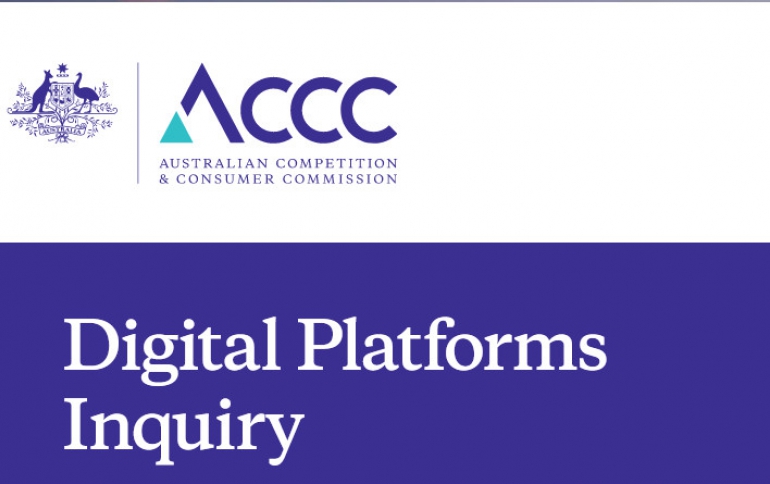
Australian Regulator Calls for Dynamic Reforms to Address Dominance of Digital Platforms
The dominance of the leading digital platforms and their impact across Australia’s economy, media and society must be addressed with significant, holistic reform, according to a repot releaed by Australian Competition and Consumer Comission (ACCC).
The report contains recommendations, spanning competition law, consumer protection, media regulation and privacy law, reflecting the intersection of issues arising from the growth of digital platforms.
“Our recommendations are comprehensive and forward looking and deal with the many competition, consumer, privacy and news media issues we have identified throughout the course of this Inquiry,” ACCC Chair Rod Sims said.
“Importantly, our recommendations are dynamic in that they will provide the framework and the information that governments and communities will need to address further issues as they arise. Our goal is to assist the community in staying up to date with these issues and futureproofing our enforcement, regulatory and legal frameworks.”
The ACCC identified many adverse effects associated with digital platforms, many of which flow from the dominance of Google and Facebook.
These include:
- The market power of Google and Facebook has distorted the ability of businesses to compete on their merits in advertising, media and a range of other markets
- The digital advertising markets are opaque with highly uncertain money flows, particularly for automated and programmatic advertising
- Consumers are not adequately informed about how their data is collected and used and have little control over the huge range of data collected
- News content creators are reliant on the dominant digital platforms, yet face difficulties in monetising their content
- Australian society, like others around the world, has been impacted by disinformation and a rising mistrust of news.
“The dominant digital platforms’ response to the issues we have raised might best be described as ‘trust us’,” Mr Sims said.
The ACCC has made a series of recommendations to address the digital platforms’ impact on Australian media businesses and how Australians access news.
These include:
- Requiring designated digital platforms to each provide the Australian Communications and Media Authority (ACMA) with codes to address the imbalance in the bargaining relationship between these platforms and news media businesses and recognise the need for value sharing and monetisation of content
- Addressing the regulatory imbalance that exists between news media businesses and digital platforms, by harmonizing the media regulatory framework
- Targeted grants to support local journalism of about AU$50 million a year
- Introducing measures to encourage philanthropic funding of public interest journalism in Australia
- ACMA monitoring the digital platforms’ efforts to identify reliable and trustworthy news
- Requiring the digital platforms to draft and implement an industry code for handling complaints about deliberately misleading and harmful news stories
- Introducing a mandatory take-down ACMA code to assist copyright enforcement on digital platforms.
The ACCC notes the acquisition of startups by large digital platforms has the potential to remove future competitive threats. Acquisitions may also increase the platforms’ access to data. Both situations may further entrench a platform’s market power.
The ACCC recommends changes to Australia’s merger laws to expressly require consideration of the effect of potential competition and to recognise the importance of data. The ACCC also recommends that large digital platforms agree to a notification protocol that would alert the ACCC to proposed acquisitions that may impact competition in Australia.
The ACCC also calls on Google to allow Australian users of Android devices (new and existing) to choose their search engine and internet browser from a number of options, as proposed in Europe, rather than being provided with defaults.
The ACCC has been also investigating into data practices to determine whether there has been a contravention of the Australian Consumer Law.
To deal with further data practices that do not fit neatly within the existing consumer law, the ACCC also recommends introducing a general prohibition on unfair commercial practices.
The ACCC has also again recommended unfair contract terms should be prohibited and should attract civil pecuniary penalties, and not just be voidable as they are now.
The ACCC further recommends a mandatory standard to bolster a digital platforms’ internal dispute resolution processes and that an ombudsman scheme be established, to assist with resolving disputes and complaints between consumers and digital platform providers.
The Australian regulator found that digital platforms’ privacy policies are long, complex, vague and difficult to navigate and that many digital platforms do not provide consumers with meaningful control over the collection, use and disclosure of user data.
“We’re very concerned that current privacy policies offer consumers the illusion of control but instead are almost legal waivers that give digital platforms’ broad discretion about how they can use consumers’ data,” Mr Sims said.
“Due to growing concerns in this area, we believe some of the privacy reforms we have recommended should apply economy wide.”
The ACCC recommends the Government establish a specialist digital platforms branch within the ACCC, with standing information-gathering powers, to proactively monitor and investigate potentially anti-competitive conduct by digital platforms and conduct that may breach our consumer laws, and to undertake rolling market studies.
“We believe continuing scrutiny is necessary given the critical position that digital platforms occupy in the digital economy, their continued expansion and the opacity and complexity of the markets in which they operate,” Mr Sims said.
One of the first tasks of the new branch should be to conduct an inquiry into the supply of ad-tech services and the supply of online advertising services by advertising and media agencies.
The inquiry would identify whether any competition or efficiency concerns exist and help achieve greater transparency in the supply of these services.




















